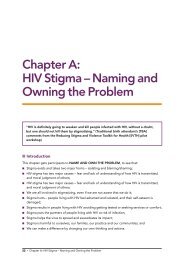Implementing Multiple Gender Strategies to Improve HIV and ... - ICRW
Implementing Multiple Gender Strategies to Improve HIV and ... - ICRW
Implementing Multiple Gender Strategies to Improve HIV and ... - ICRW
Create successful ePaper yourself
Turn your PDF publications into a flip-book with our unique Google optimized e-Paper software.
Target Audience<br />
Orphans <strong>and</strong> at-risk children, their families <strong>and</strong>/or caregivers, vulnerable<br />
girls <strong>and</strong> women, <strong>and</strong> communities greatly affected by <strong>HIV</strong> <strong>and</strong> AIDS<br />
Level of Intervention • Individual<br />
• Family<br />
• Community<br />
Geographic<br />
Location<br />
More than 122 villages in seven districts (Kibale, Lira, Masaka, Mityana,<br />
Wakiso , Mubende, <strong>and</strong> Hoima)<br />
Timeframe<br />
1998–ongoing<br />
Funders • Banana Tree Project, Scotl<strong>and</strong><br />
• Bega kwa Bega, UK<br />
• Moyera Ness Trust, Scotl<strong>and</strong><br />
• The Ug<strong>and</strong>a Orphans Fund, USA<br />
• Individual donors<br />
Partner<br />
Organizations<br />
Implementation partners:<br />
• AMESCO, Kibale District<br />
• Daughters of Mary, Masaka District Ministry of Health, Ug<strong>and</strong>a<br />
• District government offices of Wakiso, Mpigi, Masaka, Hoima, Kibale,<br />
Lira, Mityana, Mubende, <strong>and</strong> Nakaseke districts<br />
• Ug<strong>and</strong>a Farmers Association, Mpigi District<br />
• Ug<strong>and</strong>a Society for Disabled Children (USDC)<br />
• Subcounty government offices including Katabi, Kakiri, <strong>and</strong><br />
Namayumba subcounties in Wakiso district; Amach subcounty in Lira<br />
district; Nalweyo subcounty in Hoima district), Kalangaalo subcounty in<br />
Mityana district; Kass<strong>and</strong>a subcounty in Mubende district); <strong>and</strong><br />
Karuguza subcounty in Kibale district.<br />
• Women’s community-based organizations: Wakiso Women’s<br />
Development Association, Munaku Kama Women’s Group, Mirembe<br />
Women’s Group, Kivamukuteesa Women’s Group, Ogutateganya<br />
Women’s Group, Kyowola Otudde Women’s Group, Zinunula Omunaku<br />
Women’s Group, Byanana Kwekulakulanya Farmers Group<br />
Evaluation partners:<br />
• Banana Tree Project, Scotl<strong>and</strong><br />
• Bega kwa Bega, UK<br />
• External consultants<br />
IMPLEMENTATION AND RESULTS<br />
Start-up <strong>and</strong><br />
Implementation<br />
Process<br />
Communities were identified for interventions based on their <strong>HIV</strong> rate,<br />
number of orphans, <strong>and</strong> level of remoteness. Once a community was<br />
identified, a needs assessment was conducted <strong>to</strong> determine what services<br />
are needed <strong>and</strong> by whom. Program staff then put <strong>to</strong>gether packages of<br />
services, some targeting the entire community (e.g., mobile health clinic)<br />
<strong>and</strong> others targeting individuals or individual families (e.g., income-<br />
165
















